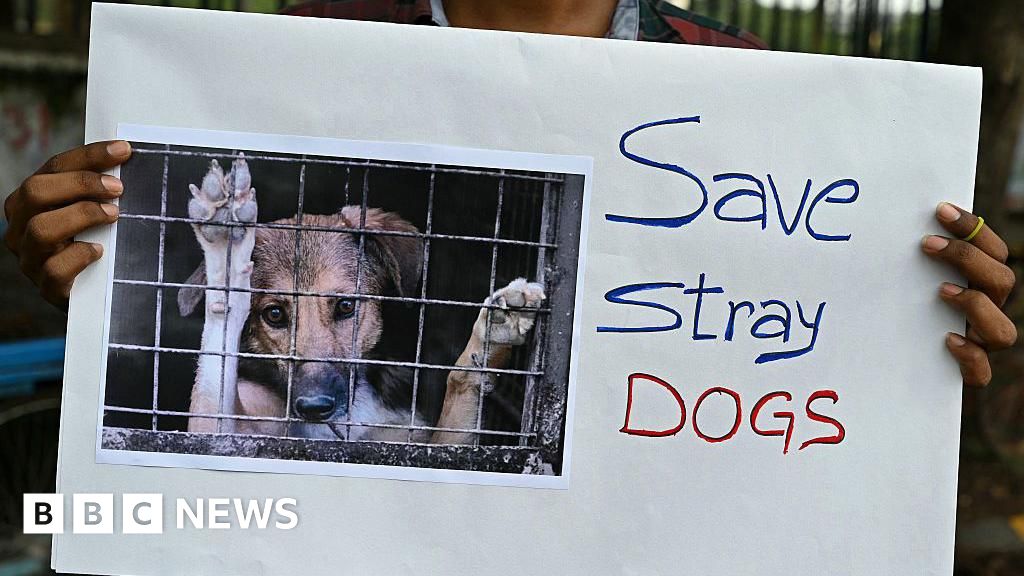Top Stories
India’s Supreme Court Revises Stray Dog Policy Amid Protests

India’s Supreme Court has amended its previous ruling regarding the management of stray dogs in Delhi and its surrounding areas, responding to significant protests from animal welfare organizations. The three-judge bench stated that stray dogs should be released back into their original locations after they have been vaccinated and sterilised. However, the court specified that dogs exhibiting rabies or aggressive behavior must be immunised and retained in shelters.
The ruling, delivered on August 11, came after a two-judge bench raised alarms over the increasing incidence of dog bites leading to rabies in the region. Current estimates suggest that Delhi hosts about one million stray dogs, with neighbouring areas like Noida, Ghaziabad, and Gurugram also facing a growing population of strays.
According to the World Health Organization, India accounts for 36% of global rabies-related fatalities. In light of this alarming statistic, the Supreme Court had initially ordered local authorities to capture all stray dogs and house them in shelters within an eight-week timeframe. This directive contradicted existing regulations that allow for the release of sterilised strays back to their capture sites, prompting strong opposition from animal welfare advocates.
Animal rights groups argued that the mass capture and sheltering of stray dogs could lead to overcrowding and potential culling. They advocated for more humane solutions, such as vaccination and neutering, rather than confinement in shelters. Following this backlash, the Supreme Court convened a three-judge panel to review the situation.
In its latest ruling, the court suspended the earlier order to round up all strays. The justices clarified that non-aggressive and non-infected dogs should be returned to their original locations after undergoing vaccination and sterilisation. The court also permitted animal lovers to apply to municipal corporations for the adoption of strays, stipulating that these dogs must not be returned to the streets.
To further manage the situation, the Supreme Court prohibited the feeding of stray dogs in public areas. It ordered the establishment of dedicated spaces for this purpose and warned that consequences would follow for anyone violating this directive. Additionally, the court signaled its intention to develop a national policy on stray dog management, as it continues to hear similar cases from various states across India.
The Supreme Court’s decision reflects a complex interplay between public health concerns, animal welfare, and the realities of managing a large stray dog population. The court’s ongoing engagement with this issue highlights the need for balanced solutions that consider both human safety and the rights of animals.
-

 Business5 months ago
Business5 months agoKenvue Dismisses CEO Thibaut Mongon as Strategic Review Advances
-

 Lifestyle4 months ago
Lifestyle4 months agoHumanism Camp Engages 250 Youths in Summer Fest 2025
-

 Sports4 months ago
Sports4 months agoDe Minaur Triumphs at Washington Open After Thrilling Comeback
-

 Sports5 months ago
Sports5 months agoTupou and Daugunu Join First Nations Squad for Lions Clash
-

 Top Stories5 months ago
Top Stories5 months agoColombian Senator Miguel Uribe Shows Signs of Recovery After Attack
-

 World5 months ago
World5 months agoASEAN Gears Up for Historic Joint Meeting of Foreign and Economic Ministers
-

 Health4 months ago
Health4 months agoNew Study Challenges Assumptions About Aging and Inflammation
-

 Business5 months ago
Business5 months agoOil Prices Surge Following New EU Sanctions on Russia
-

 Entertainment4 months ago
Entertainment4 months agoDetaşe-Sabah Violin Ensemble Captivates at Gabala Music Festival
-

 Entertainment4 months ago
Entertainment4 months agoBaku Metro Extends Hours for Justin Timberlake Concert
-

 Top Stories5 months ago
Top Stories5 months agoRethinking Singapore’s F&B Regulations Amid Business Closures
-

 Business5 months ago
Business5 months agoU.S. House Approves Stablecoin Bill, Sends to Trump for Signature









